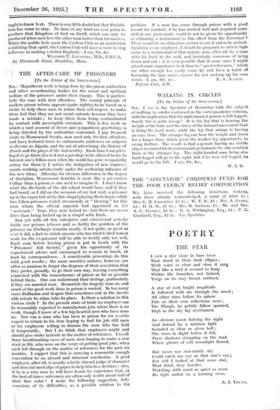THE AFTER-CARE OF PRISONERS [To the Editor of the SPECTATOR.]
Sm,—Magnificent work is being done by the prison authorities and other co-ordinating bodies for the moral and spiritual welfare of the prisoners under their charge. This is particu- larly the case with first offenders. The central principle of modern prison reform appears (quite rightly) to be based on a desire to help these men to retain their self-respect, to make them feel that they are not social outcasts because they have made a mistake ; to keep them from being contaminated by contact with incorrigible criminals. This is fine work on which a vast amount of clever and sympathetic psychology is being directed by the authorities concerned. I pay frequent visits to Wormwood Scrubs, now used only for first offenders, and have lectured there to enthusiastic audiences on subjects so diverse as Algeria, and the art of advertising, the history of Punch and the plays of Mr. Galsworthy. Each time I am privi- leged to go there (for is it not a privilege to be allowed to try to interest one's fellow-men when the world has gone temporarily astray for them ?) I notice the instigation of new improve- ments working satisfactorily under the mellowing influence of the new ideas. Allowing for obvious differences in the degree of discipline, Wormwood Scrubbs is more like a preventive College than a prison as one used to imagine it. I don't know what the die-hards of the old school would have said if they had heard, as I did on the occasion of my last visit, a prisoner up in the organ loft of the fine chapel playing Bach fugues while two fellow-prisoners toiled strenuously at blowing " for this man whom the official organist had appointed as his assistant." True, they were locked in—but there are worse fates than being locked up in a chapel with Bach.
And yet with all this enterprise and educational activity inside our prisons (classes and so forth) the problem of the prisoner on discharge remains nearly, if not quite, as great as ever it did, a fact to which anyone who has tried to find honest work for the ex-prisoner will be able to testify only too well. Each man before leaving prison is put in touch with the " Prisoners' Aid Society," given the opportunity of its experienced advice and encouraged to remain in touch, at least by correspondence. A considerable percentage do this with good results ; the more sensitive natures, however, are often so anxious to forget the disgrace of their conviction that they prefer, proudly, to go their own way, leaving everything connected with the remembrance of prison as far as possible behind them. One can understand their feelings, particularly if they are married men. Meanwhile the tragedy runs on, and much of the good work done in prison is wasted. In too many eases disillusion'and despair that sometimes end in the inevit- able return to crime take its place. Is there a solution to this vicious circle ? In the present state of trade no employer can be reasonably expected to manufacture jobs where there is no 'work, though I blow of a few big-hearted men who have done so. Nor can a man who has been in prison for six months expect to return to his firm hoping to find his job still open or his employers willing to dismiss the man who has held it temporarily. But I do think that employers might and should give wider latitude in the matter of references. I recall three heartbreaking cases of men, men longing to make a new start in life, who were on the verge of getting good jobs, when each fell through on the matter of references for the past six months. I suggest that this is carrying a reasonable enough convention to an absurd and inhuman conclusion. 'A good employer, after all, is usually a fairly shrewd judge of character and does not need slips of paper to help him to a decision ; also, if he is a wise man he will have learnt by experience that, at the best of times, references are often only worth about half of their face value ! I make the following suggestion, fully conscious of its difficulties, as a possible solution 'to the problem. If a man has come through prison with a good record for conduct, if he has worked well and acquired some skill at any given trade, could he not be given the opportunity of obtaining a testimonial to this effect from the Governor ? There would be no obligation on him to use it unless he wished. Speaking as an employer, I should be prepared to attach high value to a testimonial of that nature, won, after all, by a man with his back to the wall, and burningly conscious of being down and out : it is even possible that in some cases I might attach more importance to it than to " good references," which are often enough too easily come by and have a habit of becoming the lazy man's excuse for not making up his own






































 Previous page
Previous page